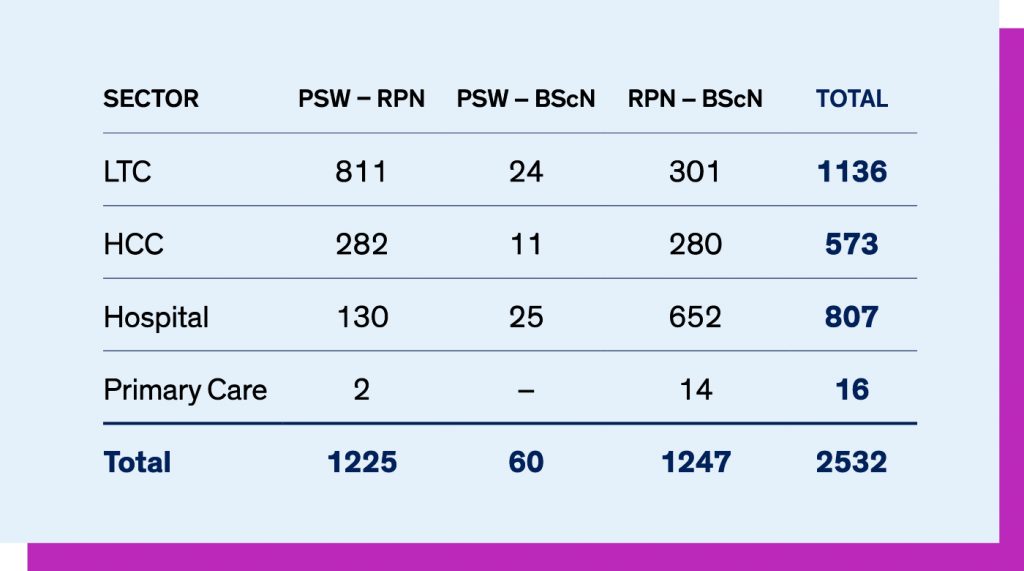If you want to change the status quo, you have to be willing to speak up.
WeRPN has worked with the provincial government to address Ontario’s nursing shortage through various efforts. One of the most innovative programs to-date has been the Bridging Educational Grant in Nursing (BEGIN) program.
“As a professional association, it’s our role to listen to RPNs and bring forward solutions to government to address the challenges they’re facing. We helped design this program to help keep nurses in the profession at a time when they are urgently needed – which benefits our colleagues and ultimately our patients”, said Dianne Martin, CEO, WeRPN.
Tailored to bolster the nursing workforce, BEGIN offers a comprehensive support system for PSWs and RPNs seeking further education and professional growth. The program’s multifaceted benefits offer financial support and career advancement opportunities.
BEGIN will have its biggest year yet in 2024 – there are more than 2,300 participants in the program. But it wasn’t easy to turn this WeRPN initiative into reality. Setting up such a program with two key provincial ministries – required dedicated advocacy and strategic collaboration.
At the heart of BEGIN is the advocacy work that WeRPN has always believed in, helping the province’s nurses and supporting their professional development.
“We want to help Ontario’s nurses grow in their role or expand their career in different ways, BEGIN offers more support for them to do that,” Tiff Blair, WeRPN’s Chief Strategy Officer.
The genesis of BEGIN was marked by proactive advocacy aimed at addressing the nursing shortage, which had been expected for years and was exacerbated by the pandemic.
At a time when nurses were struggling with unsustainable workloads, this program offered an incentive to help attract and retain people in the nursing profession.
“The government may not have funded programs like this if it didn’t become glaringly obvious during the pandemic that the nursing profession was in trouble,” says Julia Scott, WeRPN’s Director of Innovation and Program Initiatives.
While there were existing programs like the Nursing Education Initiative which supported continuing education for nurses, there was nothing that completely covered tuition. That is why WeRPN advocated to the government for a program that would support RPNs who were interested in becoming an RN.
“When COVID happened, there was additional urgency to finding more ways to keep nurses in the health system and help meet the needs in certain sectors like LTC and Home and Community care. By offering tuition reimbursements in exchange for a commitment to work in these sectors for a period of time, we could help support nurses to grow their careers while also meeting the need for nurses,” Tiff Blair explains.
BEGIN was developed through intensive collaboration with the provincial government and two separate ministries, the Ministry of Health and the Ministry of Long Term Care, each with their own individual mandates, respectively. But, Blair adds, both ministries were willing to help develop the program to bring about change.
“There was a critical juncture where WeRPN showed that putting forward this priority was a response to a challenge that was on the government’s radar,” Blair says, emphasizing the alignment of WeRPN’s advocacy with the government’s recognition of the healthcare challenges.

The program has evolved from focusing solely on tuition support to encompassing ancillary costs and expanding eligibility. This dynamic response is how WeRPN says the BEGIN program is addressing the changing landscape of healthcare needs. One of those changes has also been where nurses are working.
“Now we’re able to accept students who want to work in hospitals and primary care, not just home care and long term care,” Scott pointed out, illustrating the program’s adaptability and the government’s willingness to broaden its scope in response to sector-wide shortages.
The program was announced in 2021 and launched in early 2022. At the time it only included LTC and HCC. It was expanded in fall 2023 to include hospitals and primary care. That expansion was in response to feedback we heard from nurses and also the increased need to grow the nursing workforce in both those sectors as well.
The support from the ministries of Health and Long Term Care was not just financial but also strategic, enabling BEGIN to address both immediate and long-term needs within the healthcare system.
“Health and Long term care are the two ministries. It’s been very positive because BEGIN is viewed as a really positive program that’s having a significant impact,” Blair says.
Through BEGIN, WeRPN, in its work with the provincial government, has laid a foundation for a stronger, more resilient nursing workforce in Ontario.
The latest evolution and focus for BEGIN is its recent expansion to new sectors.
That said, it doesn’t mean the program won’t continue to shift and evolve. Blair says “WeRPN is always listening to participants and looking for ways to make the program more responsive to their needs,” Blair says.
BEGIN by the Numbers
Total numbers of participants since BEGIN’s beginngs, by role (PSW or RPN) and by sector they have chosen for their Return of Service as of March 17, 2024.

